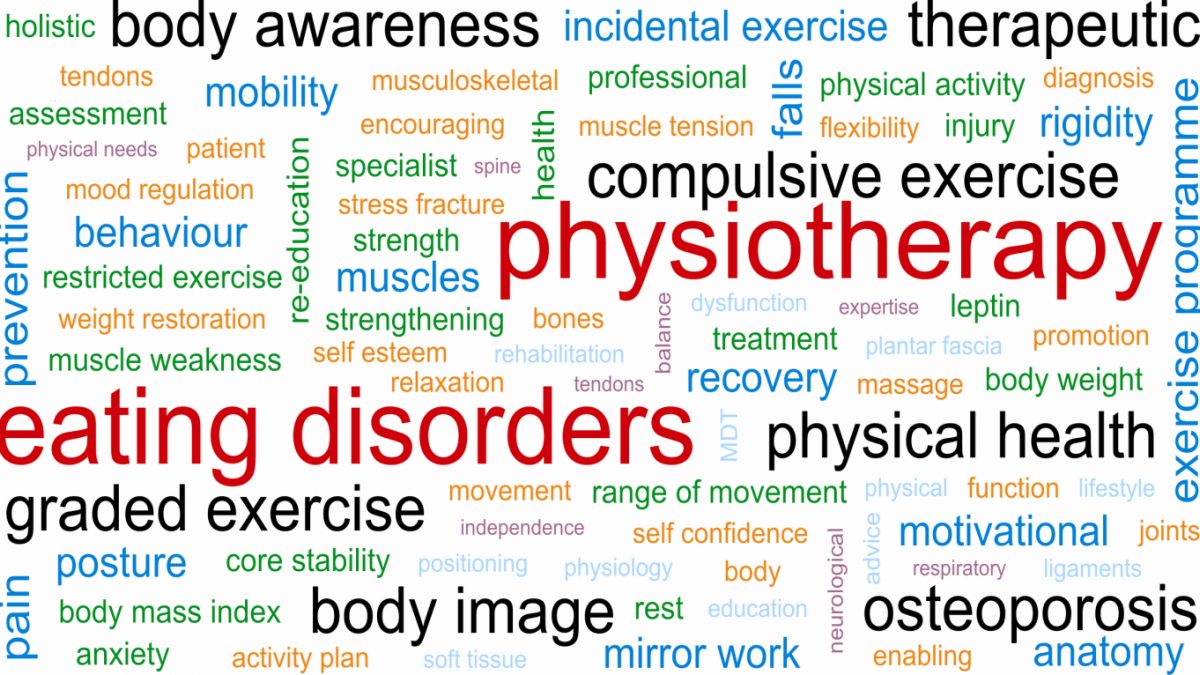This webpage provides information and resources to support Physiotherapy staff working within eating disorders, to guide and support clinical practice and professional development within this specialism.

Eating disorders is a specialist service within mental health where patients with anorexia nervosa and bulimia, including atypical presentations, have complex physiological and psychological problems. Two key features of eating disorders are distorted body image, and compulsive exercising behaviour, with the two often being interrelated, with individuals using exercise as a way of controlling their body weight and shape.
Physiotherapy has a unique role to play in the treatment of eating disorders, as a member of the multidisciplinary team using physical therapeutic interventions and education to help patients overcome their symptoms and to accept their changing body shape as they restore weight. The physiotherapy role within this field encompasses specialist assessment, advice, education, treatment and management of the various physical and psychological components of an eating disorder, and plays a vital role in the management of compulsive exercise, osteoporosis and altered body image.
As well as working individually with patients, many physiotherapists will run educative and practical exercise groups for all stages of illness, recovery and/or weight restoration, appropriate to BMI, taking into account the physical and mental health risks associated with eating disorders.
The key areas that physiotherapy can address when treating an individual with an eating disorder:
- Exercise and Physical Activity
- Body Image and body awareness
- Posture and musculoskeletal conditions
- Osteoporosis and Bone Health
- Anxiety management, relaxation and massage
Below you will find valuable resources that can provide guidance, information and evidence the role of Physiotherapy in Eating Disorders
The Physiotherapy Eating Disorders UK Professional Network Group is a specialist interest group made up of physiotherapists working in eating disorders services throughout the UK.
The aim of the group is to provide a forum for professional supervision/peer support relevant to working within eating disorders and to pool resources from a UK-wide highly specialised group of physiotherapists working within eating disorders. The group are instrumental in consolidating the knowledge base for the profession within eating disorders. This includes reviewing evidence based practice, improving the quality of service delivery, sharing and developing best practice, facilitating an opportunity for CPD and role development, and education to service providers.
For further information on the network or if you are a Physiotherapist working within Eating Disorders and would like to join the group, contact:
Chairperson –
Kate Brown, Lead Physiotherapist, Mental Health Inpatient Services, Cambridge and Peterborough NHS Foundation Trust, email - kate.brown@cpft.nhs.uk
Professional Lead –
Children and Adolescents - Anna Paterson, Physiotherapy Clinical Lead in Eating Disorders, Aneurin Bevan UHB, anna.paterson@wales.nhs.uk
Adults - Yvonne Swainson, Highly Specialist Physiotherapist, Aberdeen, NHS Grampian, yvonne.macnaughton@nhs.scot
Secretary –
Beverley Anderson, Specialist Physiotherapist, Victoria Centre, Avon and Wiltshire Mental Health Partnership NHS Trust, email - b.anderson6@nhs.net
**Please note we may not be able to reply to any emails straight away due to clinical work and varying working hours.** Unfortunately we will be unlikely to provide support with individual clinical referral requests.
Physiotherapy in Eating Disorders: A guidance document for Physiotherapists working with individuals with eating disorders
physiotherapy_in_eating_disorders_guidance_document_uk_october_2023_v2.pdf
Useful Links:
Safe Exercise at Every Stage (SEES) CLINICAL GUIDELINE FOR MANAGING AND INCORPORATING EXERCISE INTO EATING DISORDER TREATMENT SEES (safeexerciseateverystage.com) The SEES document is a clinical guideline to support clinical reasoning for the treatment and management of dysfunctional exercise in eating disorders. Please note that the guidelines are not intended for use as a physiotherapy rehabilitation guide for use in an acute medical setting.
Medical Emergencies in Eating Disorders (MEED) Guidance on recognition and management Medical emergencies in eating disorders (MEED): Guidance on recognition and management (CR233) (rcpsych.ac.uk)
Adult Eating Disorders Hub | MindEd Resilience Hub (mindedhub.org.uk)
What are you looking for - Be Body Positivehttps://bebodypositive.org.uk/what-are-you-looking-for/
Short videos and animation relating to unhealthy exercise:
- General Public Film : https://youtu.be/jQV7EUnwVOk
- Coaches and Leaders Film : https://youtu.be/RMILQtVrtew
Eating disorders and excessive exercise | University of Nottingham - YouTube
Blog: Considerations for the Gym and Eating Disorders - First Steps ED
Physiopedia: Eating Disorders - Physiopedia (physio-pedia.com)
Training opportunity:
The South London & Maudsley NHS Foundation Trust and Family Mental Wealth, in collaboration with Oxford University Press, have produced a self-directed eLearning course (in 13 bite-sized modules totalling 3½ hrs) which draws upon the textbook Eating Disorders: An Oxford Specialist Handbook (OUP 2022). This CPD-certified eLearning, presented by two of the authors of the textbook, will help all health professionals to develop the vital knowledge and skills to play an appropriate role in recognising, managing, and supporting specialist treatment for these devastating illnesses. For more information or to book go to https://familymentalwealth.thinkific.com/courses/health-professionals-elearning-ED,
Current physiotherapy in eating disorders resources:
Physiotherapy in Eating Disorders - Information Leaflet
Exercise, Activity and Osteoporosis with an Eating Disorder October 2023 Patient Information Leaflet
Physiotherapy Eating Disorder Professional Network Conference Poster 2020
Managing Physical Activity and Exercise with an Eating Disorder - Patient Information Booklet July 2020
Poster presentation - Developing a Physiotherapy led physical activity and exercise pathway as part of a multidisciplinary treatment approach on an inpatient eating disorder unit
The resources on this website are primarily intended for use within the United Kingdom. It cannot be guaranteed that the information complies with or is appropriate for use in other countries
PLEASE NOTE THAT THE FOLLOWING RESOURCES ARE CURRENTLY BEING UPDATED AND WILL BE UPLOADED TO THIS PAGE IN DUE COURSE. SOME RESOURCES MAY HAVE BEEN SUPERCEEDED BUT HAVE BEEN LEFT HERE FOR INFORMATION.
